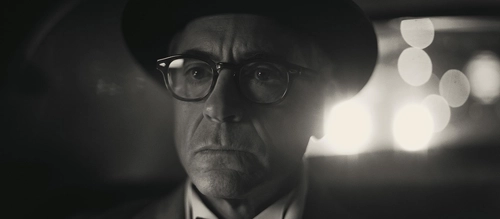Oppenheimer (2023) Review

Oppenheimer (2023)
Director: Christopher Nolan
Screenwriter: Christopher Nolan
Starring: Cillian Murphy, Robert Downey Jr, Emily Blunt, Florence Pugh, Matt Damon, David Dastmalchian, Dane DeHaan, Josh Peck, Rami Malek, David Krumholtz, Benny Safdie
“We knew the world would not be the same. A few people laughed, a few people cried, most people were silent. I remembered the line from the Hindu scripture, the Bhagavad-Gita […] ‘Now I am become Death, the destroyer of worlds.’ I suppose we’ve all thought that, one way or another.”
Christopher Nolan’s period piece about the destroyer of worlds J. Robert Oppenheimer probably won’t make you laugh, but it might make you cry, and it is almost certain to leave you in a stony silence. The renowned British-American filmmaker has captured the very essence of the famous Oppenheimer speech and has used it to chronicle the story of arguably the most transformative moment of the 20th century: the development of the first atom bomb. In doing so, he has made a $100million all-star summer blockbuster film that is capable of taking your breath away – not just because of the unique visual effects, the use of first-ever black and white IMAX stock, or the real explosions he somehow got permission to film, but because of the effectiveness of how he captures war-time anxiety and the existential dread that comes with acknowledging our world’s seemingly permanent state of conflict. Nihilism has never been seen on such an epic scale.
If the respected director’s lockdown-era release Tenet was focused too much on its concept and not enough on its characters, Oppenheimer is a step in the opposite direction. Cillian Murphy is locked to the centre of the screen for much of the film’s 3-hour runtime, his presence transforming as the weight of his character’s scientific contributions do, the pace of his dialogue delivery slowing as he goes through a series of traumatic events. His is a performance to remember, a masterclass in the microexpressions that film captures better than any other medium, a great portrayal of a real-life figure that must be considered in the same realm as Denzel Washington’s Malcolm X and Daniel Day Lewis’ Abraham Lincoln. The eye is naturally drawn to both the uniquely reserved charisma of Murphy’s portrayal and the methods through which Nolan and cinematographer Hoyte van Hoytema (Dunkirk) emphasise the character’s presence. It is truly remarkable how the most extraordinary thing about this mega-budget film isn’t some meticulously planned long take or spectacular action sequence, but is instead the human face.
Ginormous, bigger-than-ever IMAX reels have been sent to the few cinemas that can present them, and yet Nolan only brings attention to the capabilities of his relatively huge frame in dispersed moments that represent his central character’s clarity. He presents the vistas of New Mexico like shots from John Ford westerns for example, expressing Oppenheimer’s admiration for the eventual site of his nuclear experiments and thus enforcing a narrative of natural beauty in relation to human destruction, and yet the focus of his visual storytelling is less on the composition of shots and more on the technicalities of them. Much of the film is shot in the darkness of night, for example, which brings attention to how Oppenheimer illuminates near-black in a way we haven’t seen before. It is a truly staggering piece of work that brings out the details in required scenes and helps to better express the colours that are present. Perhaps most importantly it requires you to see the film in its primary environment, the cinema. Attempting to get the same experience at home, even with a 4K version of the film, will simply be impossible.
Additionally, there’s a whole story strand that is filmed in black and white. For this, Kodak developed a brand new, exclusive type of IMAX stock just for Oppenheimer, and the result is one of the most crisp and well-defined presentations of colourless cinema since Hollywood’s golden era, only in even higher definition. Focused in these moments on a very good but never quite spectacular Robert Downey Jr performance, the technique paints his character’s black and white view of the world in a quite literal sense, reinforcing Nolan’s more committed approach to character in this film and gifting Oppenheimer another uniquely cinematic quality.
Brand new film stock, better-than-ever night-time work, a renewed focus on the beauty of black and white composition in a mainstream studio movie; from a technical standpoint, there’s no debating that Oppenheimer is thrusting cinema forward. In terms of creative choices, however, there are fewer reasons to be excited.
Oppenheimer is largely set in small, confined spaces like classrooms, with as many as a dozen characters occupying a room, and yet they’re never presented in one ever-moving mass like in Kubrick’s Barry Lyndon, nor are they blocked to emphasise dynamics like Alfred Hitchcock’s Rope or Vertigo. The camera is often placed between opposing sides, with cross cuts used to present information, but rarely does Nolan leave the comfort of eye level. Perhaps the size of the IMAX cameras (which are much larger than ordinary cameras) impacted the ability to creatively stage and expressively present these scenes, but in a film that does so much technically and promises so much visually, there is an air of disappointment that comes with watching minute after minute of characters simply talking at one another.

The character-first approach to the visual storytelling ensures that Oppenheimer isn’t just a continuous dump of historically significant information, and the performances of the absurdly stacked cast of recognisable faces are very strong across the board. Even beyond the main players Cillian Murphy and Robert Downey Jr, there are the deeply troubled and vulnerable portrayals by Florence Pugh as the communist lover of the film’s lead, and Emily Blunt as Oppenheimer’s knowing and stern wife. David Krumholtz, known for his roles in The Santa Claus and 10 Things I Hate About You, offers an exceptional physical performance as Oppenheimer’s long-time friend Isidor Rabi, while Benny Safdie (Good Time) is radiating the same gravitas as some of his directorial work. Every recognisable name, from Josh Peck to Rami Malek, gets their moment here, Nolan using their fame to help us remember the myriad of significant characters that populate this story. And yet it is the ever-reliable Matt Damon as Lieutenant General Leslie Groves who seems to have the most significant impact of all the supporting characters, his performance as the tough guy with a glint in his eye being perhaps the most memorable of them all. From the moment he steps into frame, the narrative is shunted forward, Damon’s presence large enough to forge its own space in an otherwise tight character study.
Christopher Nolan has spoken a lot about his primary influences being Stanley Kubrick and Ridley Scott, and Oppenheimer certainly has elements of each. There is the same densely packed information and surgical precision that you might expect from Kubrick, and the same approach to grim fates told through all-star casts that you might see in Scott’s films. It even shares the same criticisms that are often levelled at these two masters: that there’s a distance, emotionally, to the story they’re trying to tell.
Ludwig Göransson’s score does a lot of heavy lifting regarding the heart of the piece (and is an otherwise masterful composition), and the actors are clearly all on form, yet this very specific character study – the most focused character study of Christopher Nolan’s career – doesn’t quite take you on the emotional rollercoaster that the director was able to shape in Dunkirk and Inception. For all that it leaves you heavy in the chest, it doesn’t lift you up and then take you to the point of tears; it feels like a story, a constructed piece of cinema, something further away from the nucleus of truth that Nolan was able to find in Interstellar‘s universally recognisable presentations of loss and regret.
With Oppenheimer it is abundantly clear that we (as an industry, as a filmgoing public) judge filmmakers like Christopher Nolan on a completely different scale to other filmmakers. This story, while somewhat distant to the emotive truths of our collective existence, is engaging throughout, it offers some exceptional performances, and most significantly it is important. Oppenheimer is a film that has thrust the form forward, that has broken new ground within a restrictive studio system, and has done so whilst re-evaluating the American myth of both J. Robert Oppenheimer and the atom bomb. It is a massive budget studio release that demands to be seen on the big screen, but it tells of a part of human history you could hardly argue as marketable. That such a film like this exists is a miracle forged by the artistry of its director, and the depth of undertaking that the film offers is frankly incomparable in the contemporary space. Oppenheimer is not perfect, but it is art. This is what cinema can be.
Score: 21/24
Recommended for you: Christopher Nolan Films Ranked

